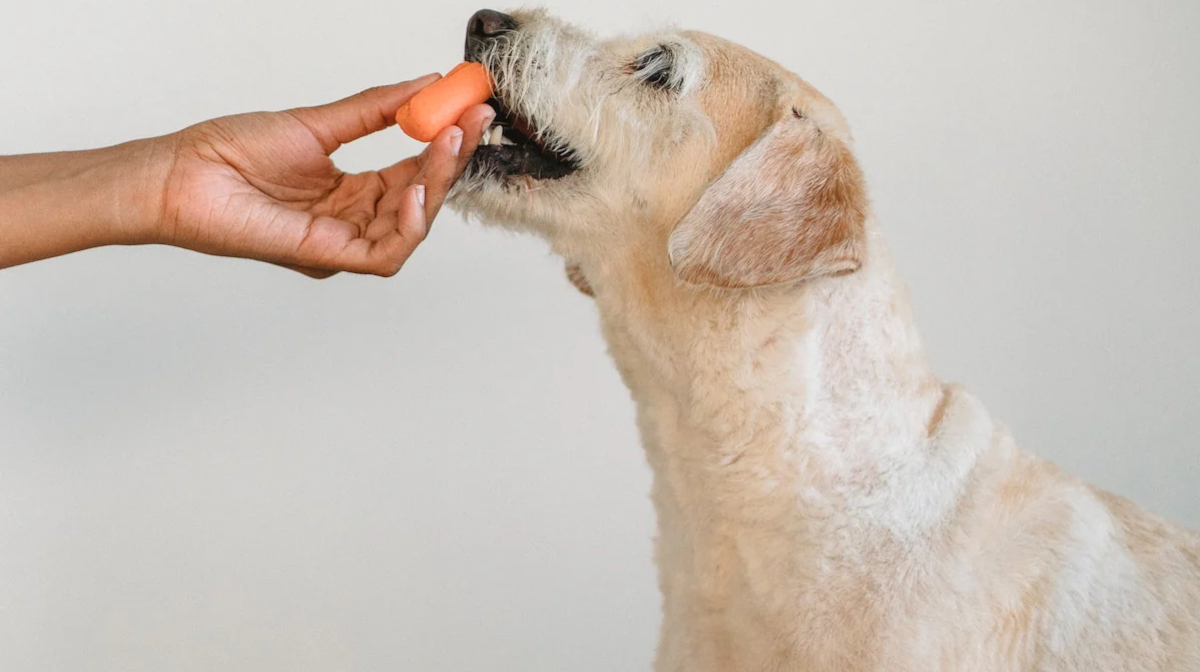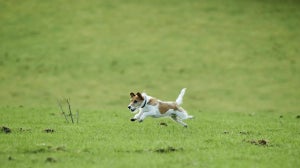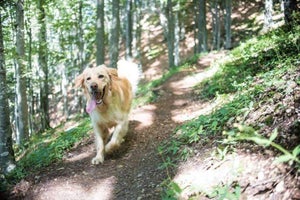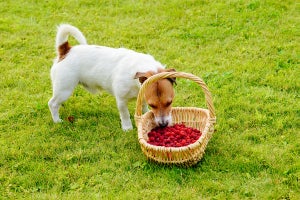
Do dogs need fibre in their diets?
It’s not uncommon to overlook fibre as a vital part of your dog’s diet, but in fact, dogs need fibre in order to maintain a healthy digestive system, weight, and promote good health. Fibre for dogs can come from their food, but can also be supplemented into their diet if needed.
Learning how to add fibre to a dog’s diet is simple and will do wonders for their health in the long run. All it takes is a bit of know-how about high fibre diets for dogs and which foods you can safely add to their bowl, which we’ll outline here.
How much fibre do dogs need?
Every pooch is different, but in general, a dog’s diet should consist of about 2-4% fibre. Too little or too much fibre can cause digestive problems, so it’s important to maintain a consistent amount of fibre for dogs, and keep an eye on how your dog reacts to any changes. Most complete dog foods provide them with a sufficient amount.
Lots of dogs will benefit from having a bit of extra fibre in their diet. Especially if your dog is experiencing digestive issues such as diarrhoea, adding fibre to a dog’s diet can help firm up their poos and keep them on a more regular schedule. Always ask your vet for their recommendation though, as many human foods aren’t suitable or safe for dogs.
The importance of complete dog food
The best way to ensure your dog gets all the fibre and nutrients they need is to feed them a complete dog food, such as James Wellbeloved™. A complete food will include everything that’s necessary for your furry friend to thrive and will have the right amount of fibre to facilitate healthy digestion and give them plenty of energy.
Our James Wellbeloved™ dog food uses natural, healthy ingredients that balance easily digestible protein with fibre from nutrient-rich sources. We add high-fibre ingredients such as carrots, seaweed, and brown rice to our recipes to aid digestion and keep your pooch feeling full all day.
What are the best sources of fibre for dogs?
A number of foods that we put on our own plates are also good sources of fibre for dogs, if you want to incorporate extra fibre to supplement a healthy diet. The best human foods for dogs are veggies, such as vitamin-rich carrots and greens. They’re easy to find and add on top of their dinner, plus veggies are a great way to add fibre to a dog’s diet while also sneaking in some extra goodness. As a general rule, keep these foods unseasoned and gently cooked, and make sure to cut them into bite-sized pieces if necessary. Some vegetables aren’t safe for dogs, so always check first.
Green Beans
A sure-fire way to increase fibre is to swap out your dog’s treats for green beans. You can use fresh or canned green beans, and give them to your dog as a snack or add to their bowl.
Carrots
Raw or steamed carrots are good for dogs as a low-calorie, high-fibre treat. You can use baby carrots, canned carrots, or whole carrots that have been cut into smaller, bite-sized pieces.
Broccoli
Broccoli is full of vitamins and fibre, so dogs can eat broccoli to reap a range of health benefits. Gently steam florets to give as a snack or add to a meal.
Quinoa
Quinoa is a dog-friendly superfood with lots of amino acids and fibre. A bit of cooked quinoa sprinkled on top of kibble will add plenty of dietary fibre.
Apples
Apples are high in fibre but low in fat and calories, making them a great high-fibre food for dogs. Be aware that apples do have sugar, so be careful not to overdo it. The skin is fine to eat, but make sure to not give your dog any seeds or stems.
Sweet Potatoes
Steamed sweet potatoes make for a great fibre boost. Simply cube or mash the sweet potatoes and add to your dog’s bowl.
Ground Flaxseed
Flaxseeds are packed with nutrients and fibre that are beneficial to your dog’s health. The key is to make sure the flaxseeds are ground; you can either buy ground flaxseeds or use a food processor to grind them yourself. Then just sprinkle on top of your dog’s food.
Leafy Greens
Leafy greens such as kale and spinach provide nutrients and fibre that can easily slot into your dog’s diet. Simply chop up the greens and add to their meal. Note that lighter-coloured greens, such as iceberg lettuce, have a higher water content and less nutritional value.
Berries
Raspberries, blackberries, and blueberries all make for good sources of fibre for dogs. A few as a snack are great, but as with apples, keep in mind that they do contain sugar.
How can you add more fibre to your dog’s diet?
Luckily, adding fibre to a dog’s diet is simple – it’s just a matter of choosing the right fibre for dogs. You can give vegetables such as carrots, pumpkin, and leafy greens as treats to your pooch or add to their usual food.
The benefits of high fibre diets for dogs
A high fibre diet for dogs can do wonders for their bodies. Fibre is necessary for a healthy digestive system, and is also important for maintaining a healthy weight. Ensuring your dog eats a consistent amount of fibre will keep them energised and happy.
Growth
As fibre for dogs is important for their health, this in turn affects growth. Puppies often suffer from diarrhoea, so a bit of extra fibre can help keep them on track. Encouraging a hearty diet with good sources of fibre for dogs will ensure your puppy’s needs are met so that they continue to develop and grow. This becomes less of a factor when dogs stop growing, but fibre still plays an important role beyond puppyhood.
Health
Digestible fibre is food for the good bacteria in your dog’s gut, which is key to a healthy microbiome. Fibre that can’t be digested is necessary as well, as it massages the colon which can reduce inflammation.
Digestion
For us humans, we tend to associate fibre with digestion and keeping things moving. This applies to our dogs too, as fibre helps to form solid poos that move through the digestive tract more easily. If your dog has digestive issues such as constipation or diarrhoea, extra fibre in their diet can help get their bowels back on track.
Weight and Hunger Management
When you feed high fibre foods for dogs, it helps keep them feeling full and satisfied for longer. This means your dog will eat less, which can help control their weight. Maintaining a healthy weight is crucial for your dog’s health. Plus, a bit of extra fibre might keep them from pawing at you ahead of dinner time!
Ultimately, fibre is incredibly important for the health of our furry friends, and it’s our job as pet parents to make sure they get everything they need. So never hesitate to ask your vet for nutritional advice, so you can avoid anything that could make them unwell.
By feeding them nutritionally balanced meals such as James Wellbeloved™ and knowing how to add fibre to a dog’s diet, our pets are a big step closer to living a healthy lifestyle.

Related Articles








